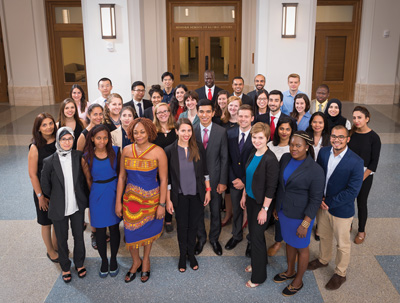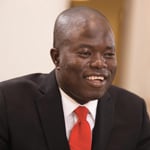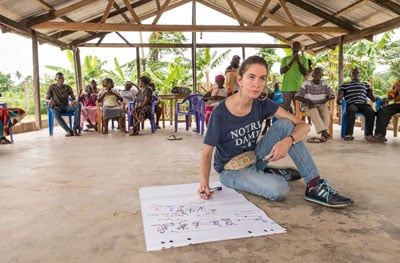2019 Graduate Education | International Affairs
THIS GUIDE IS NO LONGER ACTIVE. For the current FP Guide, click here.
University of Notre Dame, Keough School of Global Affairs
Nearly two years after opening its doors in 2017, the University of Notre Dame’s first new school in nearly a century celebrated its first graduating class this spring.
 R. Scott Appleby, Marilyn Keough Dean of the Keough School, told the inaugural graduating class, “In this next stage of your lives, we, as faculty, see ourselves as your friends, colleagues, and partners in this great, lifelong calling to ‘repair the world’ and to protect the dignity of every person. That is the heart of our mission and vocation.”
R. Scott Appleby, Marilyn Keough Dean of the Keough School, told the inaugural graduating class, “In this next stage of your lives, we, as faculty, see ourselves as your friends, colleagues, and partners in this great, lifelong calling to ‘repair the world’ and to protect the dignity of every person. That is the heart of our mission and vocation.”
The Keough School of Global Affairs shares in the University of Notre Dame’s long tradition of humanitarian engagement. Its two-year Master of Global Affairs program takes a holistic approach to human development, which sets the study of culture, religion, and community alongside economics, geopolitics, and global policy. Students learn to think broadly and imaginatively, seeing the world through the lens of integral human development.
Rigorous coursework and close engagement with policymakers shape the master’s degree program. It attracts students from around the world and faculty from a broad range of disciplines and backgrounds. Students benefit from extended fieldwork opportunities in Africa, Asia, Europe, Latin America, the Middle East, and Washington, D.C.

“The Keough School pushes us to learn and grow as thinkers and practitioners. Our discussions among classmates from different countries and different perspectives were very rich.” –Djiba Soumaoro, member of the inaugural graduating class, Master of Global Affairs, Keough School of Global Affairs, University of Notre Dame
The school’s first graduating class comprises 37 students from 22 countries—from Afghanistan to Zimbabwe. Their post-graduation plans include work with Oxfam International, Catholic Relief Services, Teach for America, and the National Committee on U.S.–China Relations, among other organizations. Some graduates have received prestigious awards, such as a Fulbright Research Award and a Boren Fellowship.
“The Keough School pushes us to learn and grow as thinkers and practitioners,” says Djiba Soumaoro, a member of the inaugural graduating class. “Our discussions among classmates from different countries and different perspectives were very rich. They were an important part of the program.”
Soumaoro, from Mali, is a recipient of the school’s Hesburgh Global Fellowship, which provides funding for a graduating member of the Master of Global Affairs program to pursue work focused on peace, justice, development, or related fields. Soumaoro will work for the Ouelessebougou Alliance, first in Salt Lake City, Utah, then in Mali’s Ouelessebougou region, where Soumaoro was born and raised. The Alliance works in partnership with local villagers to transform the quality of life in the region by facilitating sustainable health and education programs.
 “We want our students to be confident working in different cultures,” says Appleby. “We need to help make globalism effective for more and more people, not least the marginalized: the poor; the unemployed; victims of war; and the millions displaced by climate change, violence, and political oppression. Effective development requires not only economic and technological solutions, but also good governance, peacebuilding, human rights advocacy, and cultural competency.” In addition to acquiring analytical and other practical skills, Keough School students explore global issues in depth as they take a deep dive into a particular society.
“We want our students to be confident working in different cultures,” says Appleby. “We need to help make globalism effective for more and more people, not least the marginalized: the poor; the unemployed; victims of war; and the millions displaced by climate change, violence, and political oppression. Effective development requires not only economic and technological solutions, but also good governance, peacebuilding, human rights advocacy, and cultural competency.” In addition to acquiring analytical and other practical skills, Keough School students explore global issues in depth as they take a deep dive into a particular society.
A distinctive feature of the Keough School is its Integration Lab (i-Lab), through which students work with global partners, faculty mentors, and fellow students across different disciplines to address real-world issues. The i-Lab sends teams of Master of Global Affairs students to countries around the world, where they work with seasoned professionals from partner organizations, to research and help address a range of global challenges.
The Keough School’s Global Policy Initiative (GPI) brings influential policymakers and leaders to campus and maintains a Washington, D.C., office that serves as a key resource for students interested in policy-related internships and careers.
Visit the Request Info page to receive more information.
Contents
- 2019 Graduate Education | International Affairs
- UC San Diego School of Global Policy and Strategy
- NYU School of Professional Studies, Center for Global Affairs
- Johns Hopkins University School of Advanced International Studies (SAIS)
- The Fletcher School at Tufts University
- Arizona State University, Center on the Future of War
- University of Notre Dame, Keough School of Global Affairs
- Seton Hall University, School of Diplomacy and International Relations
- Syracuse University, Maxwell School of Citizenship and Public Affairs
- University of Kent, Brussels School of International Studies
- Fordham University, Graduate Program in International Political Economy and Development (IPED)